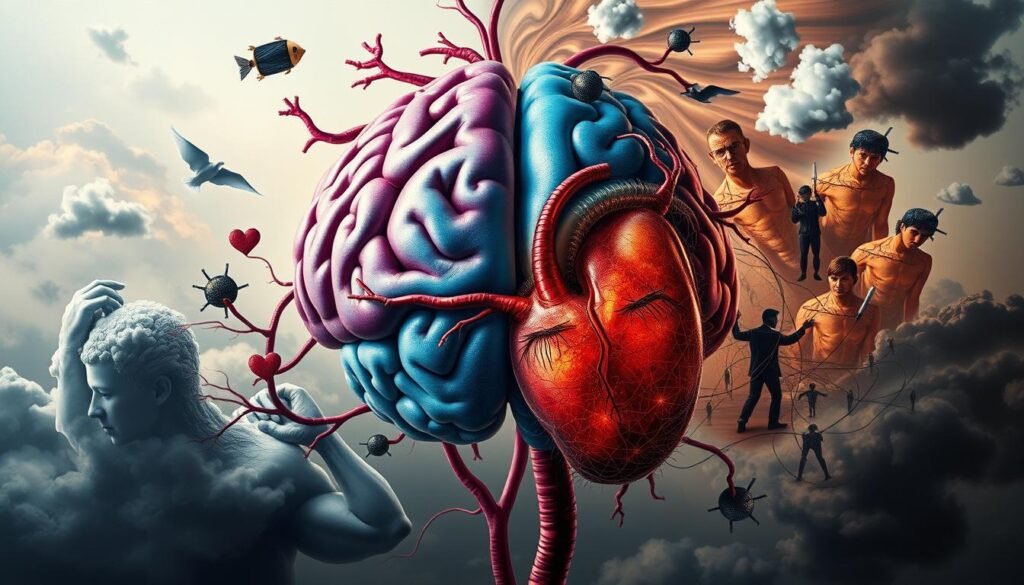A recent study showed that 2.6% of over one million people taking statins experienced anxiety. With these drugs being so commonly used, people are worried about their side effects on mental health. This raises an important question: can these cholesterol-lowering meds cause anxiety and panic attacks? Knowing how these meds might affect your mind is as important as knowing how they protect your heart.
It’s important to look into if statins cause statin anxiety or statin panic attacks. The link between cholesterol and mood disorders isn’t simple. Some research shows low cholesterol might be linked to mood problems. This article looks at what studies and people’s stories say about statins and anxiety.
Explore the research further to learn more about how statins might affect your mental health.
Key Takeaways
- Statins are some of the most prescribed drugs in the world for lowering cholesterol.
- About 2.6% of people on statins report feeling more anxious, sparking mental health worries.
- Cholesterol might affect your mood and behavior, and lowering it could have psychiatric side effects.
- Studies show we need to keep looking into how statin use affects our minds.
- It’s crucial to understand how statins and anxiety are connected for better patient care.
Introduction to Statins and Their Uses
Statins are a popular type of cholesterol medications. They are mainly used for managing cholesterol and preventing cardiovascular disease. These drugs work by blocking a specific enzyme in the liver. This blockage cuts down bad cholesterol (LDL). Lowering LDL helps avoid atherosclerosis, which can lead to heart problems.
But statins do more than just lower cholesterol. Research has shown they also reduce the risk of heart diseases. People taking statins see improvements in their blood tests. This means better heart health over time.
It’s important to understand the good things about statins. We also need to look into their safety, including any mental health effects. Knowing the pros and cons helps patients and doctors make the right choices about cholesterol care.
Understanding Statins and Cholesterol Management
Statins are key in managing cholesterol, offering health benefits. They mainly work to cut down “bad” cholesterol levels. Lowering LDL cholesterol with statins reduces heart attack and stroke risks. This boosts heart health significantly.
The Purpose of Statins in Lowering Cholesterol
Statins do more than just lower cholesterol. They guard against heart diseases by reducing heart condition risks. They are prescribed to those with high cholesterol or past heart events. This is crucial for keeping a healthy heart.
Common Types of Statins Prescribed
Doctors often prescribe various statins, each with different strengths and side effects. See the table below for some common statins and their characteristics:
| Statin | Potency | Common Effects |
|---|---|---|
| Atorvastatin | High | May worsen emotional perceptions and can lead to depressive and anxiety symptoms. |
| Simvastatin | Moderate | Potential slight improvement in emotional perception, though may increase anxiety levels initially. |
| Rosuvastatin | High | Effective in reducing LDL cholesterol; outcomes on mood are more variable. |
Atorvastatin might worsen your mood, while simvastatin might lift it slightly after an initial anxiety bump. Knowing how different statins affect you is important for managing both cholesterol and mood. For more information, you can read this detailed study here. It provides further insights into statins’ roles and their impact on mental health.

Overview of Potential Side Effects of Statins
Statins are medications used to control cholesterol. But, they might cause side effects. It’s key to know these issues if you’re taking or thinking about statin therapy. This part talks about the usual side effects and how they could affect mental health.
Recognizing Common Side Effects of Statins
Statins can have several side effects. Some common ones affecting the body include:
- Muscle pain or weakness
- Liver dysfunction
- Digestive problems
- Rash or skin reactions
These side effects range from mild to severe. So, it’s important to keep an eye on your health while on these drugs. If you notice anything worrying, talking to a doctor is wise.
Understanding Statin Side Effects on Mental Health
Statins don’t just affect the body; they can also impact the mind. Some folks have felt anxious, sad, or moody with statins. In fact, studies have found that:
- 2.6% of statin users had anxiety issues.
- 2.1% felt depression while taking statins.
- Suicide was reported in 0.6% of cases.
Even though it’s not clear if statins directly cause these mental health problems, the connection can’t be ignored. Lowering cholesterol might have its own effects on mental health, aside from statins. This shows the complicated ties between statins, cholesterol, and mental health.

If you’re on statins, knowing these possible mental health effects is vital. Always talk openly with your doctor about how you’re feeling overall.
Can Statins Cause Anxiety and Panic Attacks?
Does taking statins lead to anxiety and panic attacks? Let’s look at the research. Some studies say high-potency statins might make mood or anxiety worse. Yet, others show little link between statins and more anxiety.
A big study with over 1.1 million people found no strong connection between statin use and anxiety. Few in this group felt anxiety or similar issues. This means statin-related anxiety isn’t common among most people.

Experts have been looking at how statins might affect our minds, especially regarding statin panic attacks. A few people have felt mood changes after starting statins. However, most studies found managing cholesterol doesn’t upset mental health.
Recent research also showed statins usually don’t link to suicide, anxiety disorders, or seizures. Even with some reports, not everyone will feel bad from statins. Everyone reacts differently to these medications, showing how complex our responses can be.
Research Findings on Statins and Psychological Symptoms
Many studies have looked into how statins affect mental health. A large study followed over a million people. It found that about 2.6% who took statins had anxiety disorders. Around 2.1% had depressive disorders.
This suggests a slight link between statins and these mental health issues. But, the overall effect on mental health seems to be small.
Clinical Studies Linking Statins to Mental Health Issues
A study with 50 healthy volunteers showed interesting results. They were split into two groups. One took atorvastatin and the other a placebo for a week. The atorvastatin group was better at recognizing fearful faces.
They also made more mistakes in classifying these expressions. Yet, there were no big changes in other mental or behavioral aspects. This makes us wonder about atorvastatin’s wider psychological impacts.
Evidence Regarding Anxiety Disorders and Statin Use
Other studies have given mixed views on statins and anxiety disorders. The data shows no big risk increase for anxiety disorders, with a hazard ratio of 0.99. This means statins might not strongly affect the chance of getting anxiety disorders.
Most statin users in the study were over 50. This could affect how we see statins’ psychological impacts on them.
Talking to healthcare providers is crucial before starting statins, especially for anxiety treatment. Knowing about different anxiety medications can help a lot. For more info on anxiety treatments, check here.
Examining Statins and Depression Symptoms
Research shows a mixed view of how statins, the cholesterol-lowering drugs, impact mental health. Some studies show they might lower depression rates. But, others suggest they could cause depression symptoms to start.
Exploring the Drug’s Impact on Depression Rates
In a study, only 2.1% of people taking statins were diagnosed with depression. It seems statins might lessen the chance of getting depression, with a hazard ratio of 0.91. This hints at statins’ possible role in treating mental health issues.
Most statin users in the study were 50 or older, making up 88.4% of the group. They also noticed anxiety disorders in 2.6% of these individuals.
Statins vs. Antidepressants: Understanding their Effects
Statins and antidepressants affect mental health differently, sparking big interest. It’s key to know how they compare in treating mood disorders. Some are looking into statins to boost the effects of antipsychotics. This highlights the complexity of managing mental health and cholesterol together.
Case Studies and Reports on Statin Anxiety
Stories and case studies shed light on people feeling anxious from statin use. A closer look shows many patients on statins experiencing psychiatric side effects. These include increased anxiety, irritability, and other mental health issues. This raises questions about the safety of these medications.
Individual Accounts of Anxiety Linked to Statin Use
Many people have talked about feeling anxious while taking statins. Some studies show a few users might get anxiety disorders. For instance, about 2.6% of statin users were found to have anxiety disorders. These personal stories help us understand the risks of statins better.
Case Report Analysis of Psychiatric Adverse Drug Reactions
Deeper analysis of case reports shows statins could cause serious mental health issues. Some cases show big changes in behavior, like more aggression and personality changes. For example, some patients became very angry or had strong emotional reactions. This shows we need to be careful about statins and mental health.
| Psychiatric Condition | Incidence in Statin Users |
|---|---|
| Anxiety Disorders | 2.6% |
| Seizures | 2.5% |
| Depressive Disorders | 2.1% |
| Suicidal Outcomes | 0.6% |
Various studies point to an increase in research on statin-related anxiety. It’s important for patients and doctors to talk about the mental health side effects of statins. As research grows, these discussions can help manage potential risks.
Managing Statin Anxiety and Associated Symptoms
Dealing with statin anxiety can involve many approaches. For those feeling anxious from statin use, adding lifestyle changes is key. Exercise, mindfulness, and a healthy diet help with anxiety. Also, making time for relaxation and hobbies helps our mental health a lot.
Identifying Strategies for Coping with Anxiety
Adding stress management into our daily lives can reduce anxiety. Deep breathing, meditation, and yoga are very helpful. They let individuals take control of their feelings. It’s important to regularly do these practices to see what helps the most, especially when dealing with statin-related symptoms.
Importance of Communication with Healthcare Providers
Talking openly with healthcare providers is vital for managing statin anxiety. Sharing side effect worries helps improve the care we receive. It lets us adjust our treatment if needed. Open talks make us feel supported and let us share our experiences. This is especially true for symptoms affecting our life quality. For more on statins and mental health, check out this study here.